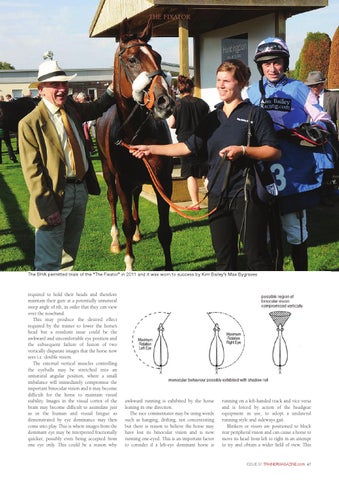FIXATOR ISSUE 37_Jerkins feature.qxd 05/03/2012 09:30 Page 2
THE FIXATOR
The BHA permitted trials of the “The Fixator” in 2011 and it was worn to success by Kim Bailey’s Max Bygraves
required to hold their heads and therefore maintain their gaze at a potentially unnatural steep angle of tilt, in order that they can view over the noseband. This may produce the desired effect required by the trainer to lower the horse’s head but a resultant issue could be the awkward and uncomfortable eye position and the subsequent failure of fusion of two vertically disparate images that the horse now sees i.e. double vision. The external vertical muscles controlling the eyeballs may be stretched into an unnatural angular position, where a small imbalance will immediately compromise the important binocular vision and it may become difficult for the horse to maintain visual stability. Images in the visual cortex of the brain may become difficult to assimilate just as in the human and visual fatigue as demonstrated by eye dominance may then come into play. This is where images from the dominant eye may be interpreted fractionally quicker, possibly even being accepted from one eye only. This could be a reason why
awkward running is exhibited by the horse leaning in one direction. The race commentator may be using words such as hanging, drifting, not concentrating but there is reason to believe the horse may have lost its binocular vision and is now running one-eyed. This is an important factor to consider if a left-eye dominant horse is
running on a left-handed track and vice versa and is forced by action of the headgear equipment in use, to adopt a unilateral running style and sideways gait. Blinkers or visors are positioned to block rear peripheral vision and can cause a horse to move its head from left to right in an attempt to try and obtain a wider field of view. This
ISSUE 37 TRAINERMAGAZINE.com 47
